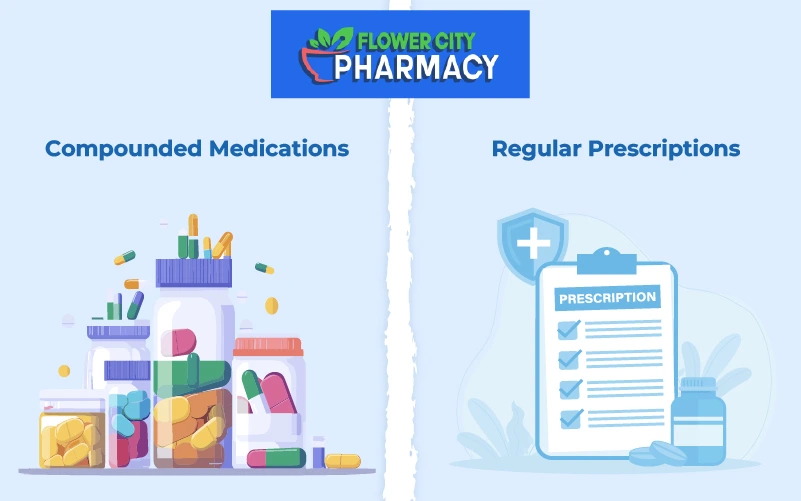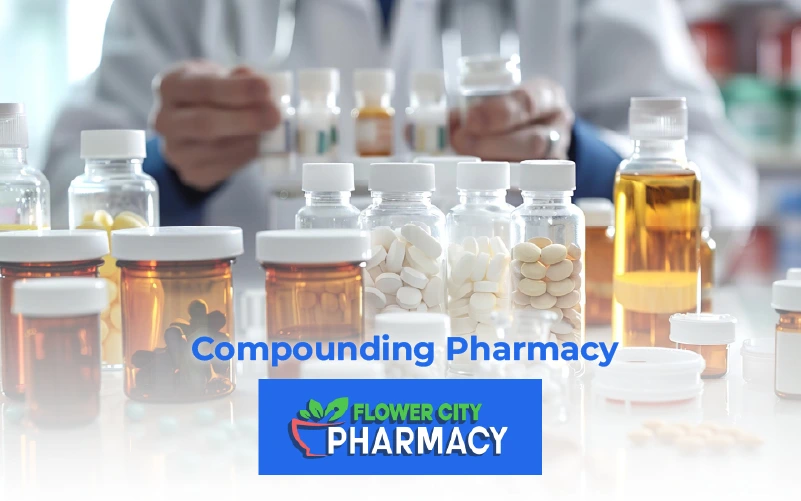Published on: 25 Sep 2024
Table of Contents
- What Are Compounded Medications?
- What Is Compounding in Pharmacy?
- How Are Compounded Medications Made?
- Are Compounded Medications Safe?
- What Conditions Can Be Treated with Compounded Medications?
- How Do Compounded Medications Differ from Regular Prescriptions?
- Can Compounded Medications Be Covered by Insurance?
- How to Obtain Compounded Medications?
- What Are the Most Common Forms of Compounded Medications?
- Are There Any Risks Associated with Compounded Medications?
- Conclusion
- How Flowercity Pharmacy Can Help
1. What Are Compounded Medications?
All FDA approved medications can not be suitable for all patients. There are some patients who may have an allergy from a drug or may be a child or aged person who can not swallow the medicine. To fulfil these specific preferences of individual patients, personalised medications are prepared.

Role of pharmaceutical compounding in modern healthcare:
- Compounding supports mass-produced medications by providing personalised treatment possibilities for persons with specific needs.
- By improving customer satisfaction and results through personalization, compounding guarantees that healthcare becomes more consumer-centred.
2. What Is Compounding in Pharmacy?
Compounding in pharmacy refers to the process of creating a customised medication for those patients who have specific needs. It is prepared in small quantities. Whereas In mass-produced medications, the pharmaceutical companies prepared medicines in bulk. These medications are generally FDA approved.
From receiving a prescription, ingredient selection, formulation, to quality control, labelling and dispensing, all the process is completed by the certified pharmacists.
Benefits of compounding medications:
- It is prepared to meet the specific needs of the patient.
- Compounding medications can be delivered in different formats like liquids, gels, patches etc.
- Compounding medications are also customised for pets.
3. How Are Compounded Medications Made?
The compounding process involves several important steps:
- Prescription receipt: First of all, our pharmacists receive a specific prescription which is reviewed by our certified pharmacists. They will check if we already have the same formula or are required to create a new one.
- Selection of ingredient and formulation: Our pharmacists will choose the top quality ingredients, carefully calculate the correct amount of dosage. We have advanced equipment to combine the different elements to create desired formulation.
- Quality control & Packaging: After preparing the compounding medications, they are tested for the quality. Our skilled pharmacists will make sure that everything is perfect such as accuracy of dosage, correct formulation, and the safety. After this, these medications are packed and labelled correctly with patient name, how to use instruction, and also the export date.
- Patient consultation: Our pharmacists will consult the patients after they pick up the medication. Every important information is shared with him like how to use it, proper dosage and how to store it properly.
4. Are Compounded Medications Safe?
Safety Standards and Regulations
The pharmaceutical drug directorate (PDD) executes the foods and drugs regulations under the food and drugs act which ensures that pharmaceutical products provided in Canada are safe and effective.
Quality Assurance in Compounding
- Conduct routine monitoring of the area where the compounding process is being performed.
- Ensure the use of high-quality ingredients to meet the standards of quality.
- Always label the medications clearly stating the ingredients, expiry dates and other important information.

5. What Conditions Can Be Treated with Compounded Medications?
- Some specific conditions like chronic pain conditions, regular medications are not suitable for them. Customised medications in the form of gels, cream can give relief from pain.
- Children do not require the same amount of dose as the adult needs. Compounding medications can create smaller and accurately calculated doses for them.
- Conditions like menopause, low testosterone, and thyroid dysfunction are treated by using Hormone replacement therapy (HRT).
- Compounding offers personalised treatment solutions for animals who need accurate dosages or flavour that can be easily digested by them.
6. How Do Compounded Medications Differ from Regular Prescriptions?
- Individualized vs. Standardized: If you need a unique prescription based medicine such as for your eyes, skin or even for your pet, regular medications are not for you. Compounding pharmacists will prepare medications that are specific to fulfil your needs.
- Availability: Some patients may need a dosage of medication which is not available commercially. Compounding pharmacists create those medicines to make available for the patient.
- Customization: Regular medications are general medicines but Compounding medications are prepared to keep specific needs such as dosage, flavour, and form in mind.
Who Needs Compounded Medications?
- Those patients who are allergic to any particular ingredient.
- Those patients who have specific preferences like gluten-free or sugar-free medicines.
- Those patients who are suffering from long-term conditions like chronic pain or cancer.
- Those patients who are going under hormone replacement therapy.
7. Can Compounded Medications Be Covered by Insurance?
Compounded medications insurance cover depends on the insurance company. Some companies cover it, some cover it under special circumstances and some don’t. There are some factors which are considered while insurance coverage:
- Most insurance companies cover compounded medications only if the ingredients are approved by FDA.
- Chances of getting insurance cover is high if the need for the compounded medication is essential.
- Insurance cover can also vary by the state laws or regulations.
How can you check your plan to get compounding benefits:
- The best way is directly contacting your insurance company.
- You can also check your policy documents in which a list of the covered prescriptions is mentioned.
- You can take your doctor’s help to get a proof of the medical need which will increase the chances of getting insurance cover.
Tips on how to work with insurance companies to potentially cover compounded medications:
- Take a letter from your doctor explaining why the general medicine is not effective for you and compounded medication is necessary.
- Some insurance companies cover the compounding medications only if they are within their network. You can take the list of these in-network pharmacies.
- Some insurance companies do not cover direct compounded medications but they can have other insurance offers like partial reimbursement.
8. How to Obtain Compounded Medications?
Getting a Prescription for Compounding
- Firstly, consult your doctor to examine your medical needs and find whether a compounded medication is needed for you.
- Discuss everything about your specific needs such as allergies (if any), dosage type, any other preference like gluten-free or sugar-free medication etc.
- Once your doctor gives confirmation that compounded medication is essential according to your medical conditions, he will provide you with a prescription which includes all the details regarding compounding medication.
- The last step is to take the prescription to the compounding pharmacy.
Choosing the Right Compounding Pharmacy
- Compounding professionals are a must when you look for a trustworthy pharmacy.
- The reputable pharmacy will always follow the guidelines and quality control protocols.
- Customer service after prescription is required to discuss your concerns and get relevant information about your compounded medications.
Our pharmacy is accredited by the Ontario College of Pharmacists (OCP) which ensures that the pharmacy is providing safe compounding medication services. We have a team of experienced pharmacists who will always make sure that you receive safe compounding medications.
9. What Are the Most Common Forms of Compounded Medications?
- Capsules: capsules are made in different combinations.
- Solutions: These are in liquid forms especially for children or for those patients who have difficulty in swallowing.
- Creams or gels: It can be applied directly to your skin.
- Nasal spray: Commonly used for allergy which is delivered through the nasal cavity.
- Sterile injections: Commonly used for therapies or pain management.
Matching Medication Form to Patient Needs
Choosing the right form of medications can depend on the patient’s age, their medical conditions, allergic reactions etc.
- Generally liquid solution form is used for babies.
- Patches or topical creams are used to relieve long term pain.
- Those patients who have digestion issues and can not take oral medications injections can be used.
10. Are There Any Risks Associated with Compounded Medications?
Understanding Potential Risks
- There can be a risk involved in the amount of dosages if the pharmacy does not follow protocols strictly.
- Both underdosing or overdosing is harmful for patients and it can happen in calculating the doses.
Yes, there are risks involved in compounding pharmacy but here is how we can help you in minimising these risks:
- We have experienced pharmacists who carefully select the best quality ingredients to prepare the medication for you which reduces the risk involved in compounding.
- Sterile medications should be prepared in a clean area as per USP<797> and USP <795> guidelines and our pharmacist follows these without any error.
- We use advanced equipment which makes sure that there is consistency in every batch.
Conclusion
Compounding medications have numerous benefits for those patients who require customised medication rather than regular one. Patients who have specific preferences like sugar-free or gluten-free medications, allergic to any drug will get personalised medications.

How Flowercity Pharmacy Can Help
Our experts are committed to providing safe medications using high quality ingredients. We also provide consultation services to help you in all your doubts regarding how to use it, the proper dosage or any related query.
FAQs
- Can I Get Compounded Medications Without a Prescription? No, you have to get a prescription from your healthcare provider to get compounded medications.
- How Long Do Compounded Medications Last? It depends on the ingredients used and the formulation of compounded medication. Generally they can be used for a shorter period of time as compared to regular medication.
- Are Compounded Medications FDA Approved? No, they are not approved by the FDA as they are specifically made for individual needs.
- How Much Do Compounded Medications Cost? The cost is based on the ingredients and the needs of the individual.
Do you want custom medications that you can rely on? Don’t look further! Visit us today for personalized medication, expert advice, high quality health products and easy prescription fills and many more. Reach out to us as flowercitypharmacy@gmail.com.








